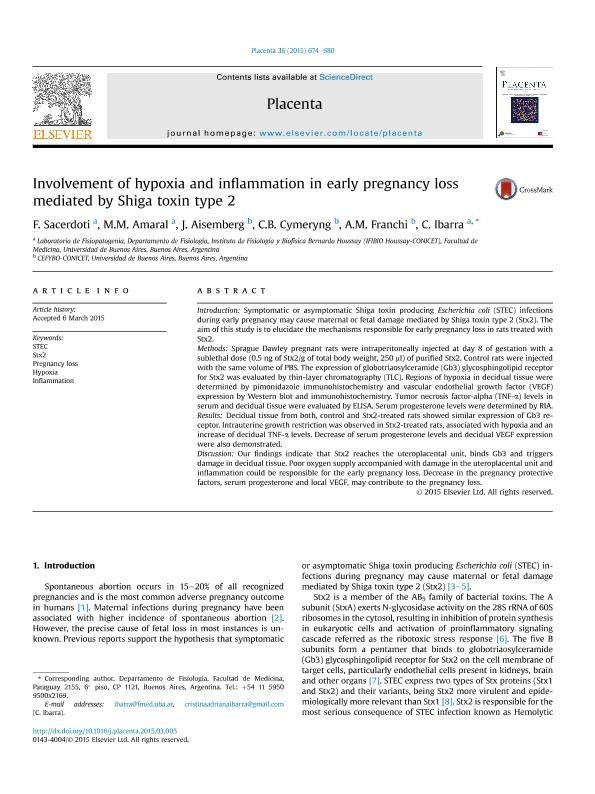Artículo
Involvement of hypoxia and inflammation in early pregnancy loss mediated by Shiga toxin type 2
Sacerdoti, Flavia ; Amaral, María Marta
; Amaral, María Marta ; Aisemberg, Julieta
; Aisemberg, Julieta ; Cymeryng, Cora Betriz
; Cymeryng, Cora Betriz ; Franchi, Ana Maria
; Franchi, Ana Maria ; Ibarra, Cristina Adriana
; Ibarra, Cristina Adriana
 ; Amaral, María Marta
; Amaral, María Marta ; Aisemberg, Julieta
; Aisemberg, Julieta ; Cymeryng, Cora Betriz
; Cymeryng, Cora Betriz ; Franchi, Ana Maria
; Franchi, Ana Maria ; Ibarra, Cristina Adriana
; Ibarra, Cristina Adriana
Fecha de publicación:
06/2015
Editorial:
Elsevier
Revista:
Placenta
ISSN:
0143-4004
Idioma:
Inglés
Tipo de recurso:
Artículo publicado
Clasificación temática:
Resumen
Introduction Symptomatic or asymptomatic Shiga toxin producing Escherichia coli (STEC) infections during early pregnancy may cause maternal or fetal damage mediated by Shiga toxin type 2 (Stx2). The aim of this study is to elucidate the mechanisms responsible for early pregnancy loss in rats treated with Stx2. Methods Sprague Dawley pregnant rats were intraperitoneally injected at day 8 of gestation with a sublethal dose (0.5 ng of Stx2/g of total body weight, 250 μl) of purified Stx2. Control rats were injected with the same volume of PBS. The expression of globotriaosylceramide (Gb3) glycosphingolipid receptor for Stx2 was evaluated by thin-layer chromatography (TLC). Regions of hypoxia in decidual tissue were determined by pimonidazole immunohistochemistry and vascular endothelial growth factor (VEGF) expression by Western blot and immunohistochemistry. Tumor necrosis factor-alpha (TNF-α) levels in serum and decidual tissue were evaluated by ELISA. Serum progesterone levels were determined by RIA. Results Decidual tissue from both, control and Stx2-treated rats showed similar expression of Gb3 receptor. Intrauterine growth restriction was observed in Stx2-treated rats, associated with hypoxia and an increase of decidual TNF-α levels. Decrease of serum progesterone levels and decidual VEGF expression were also demonstrated. Discussion Our findings indicate that Stx2 reaches the uteroplacental unit, binds Gb3 and triggers damage in decidual tissue. Poor oxygen supply accompanied with damage in the uteroplacental unit and inflammation could be responsible for the early pregnancy loss. Decrease in the pregnancy protective factors, serum progesterone and local VEGF, may contribute to the pregnancy loss.
Palabras clave:
Hypoxia
,
Shiga Toxin 2
,
Inflammation
,
Pregnancy Loss
,
Tnf-Alfa
,
Gb 3
,
Progesterone
Archivos asociados
Licencia
Identificadores
Colecciones
Articulos(CEFYBO)
Articulos de CENTRO DE ESTUDIOS FARMACOLOGICOS Y BOTANICOS
Articulos de CENTRO DE ESTUDIOS FARMACOLOGICOS Y BOTANICOS
Articulos(OCA HOUSSAY)
Articulos de OFICINA DE COORDINACION ADMINISTRATIVA HOUSSAY
Articulos de OFICINA DE COORDINACION ADMINISTRATIVA HOUSSAY
Citación
Sacerdoti, Flavia; Amaral, María Marta; Aisemberg, Julieta; Cymeryng, Cora Betriz; Franchi, Ana Maria; et al.; Involvement of hypoxia and inflammation in early pregnancy loss mediated by Shiga toxin type 2; Elsevier; Placenta; 36; 6; 6-2015; 674-680
Compartir
Altmétricas



